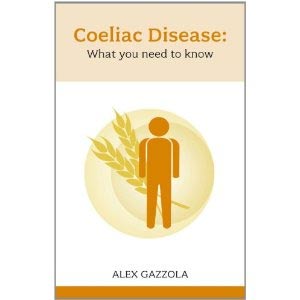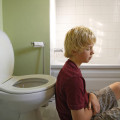 Are you an IBS suffererer? Do you think you might be?
Are you an IBS suffererer? Do you think you might be?
Sophie Lee is—has been for 20 years—and she sent her new book to me to review for you. It’s called, appropriately enough, ‘Sophie’s Story’.
It might seem an odd statement, given that her book details her pain and embarrassment over the years, but I loved it.
The book is full of personality and humour, as well as conveying some very important messages about the importance of communication.
Tell others you have a problem
Sophie spent years not telling: not telling her parents, her friends or her employer. So—like many other IBS sufferers, I’m sure—she spent a long time feeling alone.
You can’t expect people to understand unless you tell them.
Find others to talk to
Communicating your difficulties to non-IBS sufferers is one thing—and perpetually educating others can get wearying—but communicating with others with IBS, even if their symptoms are different, can be very helpful.
Go to Sophie’s site, IBS Tales, to start with, and join the conversation. Maybe you can find others in the future, and help them get over their embarrassment and talk.
Tell the world
I don’t mean that everyone should talk about their bowels all the time! But by bringing these problems out into the open, and talking frankly about the day-to-day difficulties they cause, will help all IBS sufferers. Sophie does this via her website, but has also done interviews with print and broadcast journalists.
Another example of speaking despite embarrassment: Ally (who has Crohn’s), on the UCB corporate website. If you haven’t read her story yet, do.
Get the message out: it helps everyone.
IBS, CD and the gluten free diet
We don’t do IBS in this house (thank goodness!) but we do ‘do’ coeliac disease: I know about the Bristol Stool Chart, and about steatorrhoea. And we also, of course, do gluten free, and have done for years. A gluten free diet is one of the things that have helped Sophie manage her symptoms (go and buy her book for the full list).
In the past, Sophie turned down opportunities because of her worries over symptom-management. Coeliac disease comes with a treatment plan – live gluten free – but we too have made choices because of the condition, though in our case it is about managing the treatment plan rather than managing the symptoms; all part of living with a chronic condition.
There is a degree of misdiagnosis and confusion between these various disorders. Ovarian cancer is sometimes misdiagnosed as IBS; so is coeliac disease. So: if you’re reading this, it’s probably because you have, or care for, someone who has, bowel problems. Whatever your symptoms, make sure you’ve had a full suite of tests, so that the correct diagnosis is reached.
Get tested. And get talking.
 |
I’ve written a book summarising what we’ve learnt over 20 years of dealing with the gluten free diet, and it might be just what you’re looking for. It packs the lessons we’ve learned into what I hope is a helpful and straightforward guidebook. It’s available on Amazon, as a paperback or for your Kindle… |





